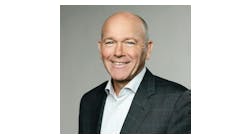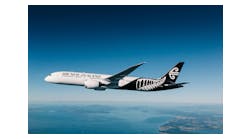Nov. 12--Etihad Airways, which has set a world record by becoming the fastest growing airline in commercial aviation history in the first one decade of operations, is now striving to achieve yet another dream -- to be the world's best airline.
It may appear rather preposterous or a far too ambitious goal for most other carriers, but for the 10-year old UAE national airline that dream may not be more than a modest target, and plainly a logical next phase in its breathtaking growth saga.
James Hogan, Etihad Airways President and Chief Executive Officer, describes Etihad's journey to becoming a major force in global civil aviation as a fascinating and remarkable one:
"Today, we are a mature and robust business and one whose simple vision remains the same: to be the world's best airline."
Hogan, who has been at the helm of Etihad since 2006, sums up the inspiring growth saga of the airline that has "set fresh and exciting standards in the airline industry." Thee 10th anniversary celebration is "a truly momentous occasion," he says. "In one decade we have become the fastest growing airline in commercial aviation history and firmly established ourselves on the global travel stage," says Hogan.
From a start-up airline with limited brand awareness, inefficiencies of scale, poor network connectivity, and a lack of airline partners and alliances, the airline has truly come of age as a role-model in commercial aviation, he points out. Etihad now flies to 96 destinations with a fleet of 86 aircraft, and has 90 aircraft on firm order, including 41 Boeing 787-9 Dreamliners and 10 Airbus A380s.
At the Dubai Air Show opening on November 17, Etihad is expected to place orders for scores of new jets, including the revamped Boeing 777X mini-jumbo and a repeat order for its 787 Dreamliner to add to 41 such modern aircraft in its fleet now. Hogan maintains that at the heart of Etihad's vision are founding principles that "remain as relevant today as when it took flight in 2003: to be safe, profitable, and offer outstanding products delivered with the highest levels of customer service."
"Each year we have hit our numbers and developed safe and secure operations with stringent processes and procedures," says Hogan.
He argues that the airline emerged as a profitable business in an environment where making profit is no mean feat. "This is not least because our products and services have set fresh and exciting standards in the airline industry."
Hogan, who was recognised for his "outstanding strategic thinking and leadership" at the World Travel Awards in July, believes that Etihad's strategic equity alliance has been groundbreaking.
"Our partnerships with airberlin, Air Seychelles, Aer Lingus, and Virgin Australia will be bolstered with our stake in Air Serbia from January and also Jet Airways, subject to regulatory approvals."
Etihad, which launched its equity investment strategy in 2011 with the purchase of a 29 per cent stake in airberlin, followed it up with a 40 per cent investment in Air Seychelles, which included a five-year management contract. The buying spree continued in 2012 with an investment in Virgin Australia and a three per cent stake in Ireland's Aer Lingus. In August, Etihad acquired a 49 per cent stake in Serbia's national carrier, Jat, joining forces with Belgrade to inject $100 million into the unprofitable airline that it plans to re-brand as Air Serbia in November.
In the first half of this year, Etihad clinched a $600 million deal with Jet Airways of India for a 24 per cent stake and access to Jet's coveted takeoff and landing slots at Heathrow Airport in London. In October, India's cabinet approved a deal to sell stake in Jet Airways.
As Etihad continues to boost its global presence through a mix of organic growth and strategic partnerships, Hogan does not rule out his airline's appetite for still more such equity partnerships and strategic investments. "We have created a new model in modern aviation practices, working tirelessly to fulfill the commercial mandate we were given and in doing so created a world-class airline with operations that now span the six continents of the globe."
Defending his growth model at a recent conference in Cologne, he pointed out that global reach is beyond the capacity of any single airline and progress must come through partnership.
"The investments we are making are delivering significant benefits not only to the airlines but to our passengers and freight customers. We will consider more strategic partnerships if they add value."
Etihad delivered profitability in 2011 -- just eight years after operations commenced -- and strengthened profitability in 2012. "It is a winning habit that we must never lose sight of."
In 2012, the airline reported a 200 per cent increase in net profits to $42 million on revenues of $4.8 billion, a rise of 17 per cent on the previous year. It also enabled two of its equity partners -- airberlin and Air Seychelles -- return to profitability. Passenger numbers rose by 23 per cent to more than 10 million.
Hogan maintains that Etihad's role as key enabler to Abu Dhabi's Plan 2030, the blueprint for its future development, remains as important today as it did in 2003 and the airline's economic contribution has been impressive.
"Our contribution to the UAE's Gross Domestic Product (GDP) for 2012 is put at $10.7 billion -- 10.5 per cent of Abu Dhabi's non-oil GDP," says the airline chief.
He suggests that Etihad's vision stretches beyond that of a normal national carrier as its business is key to the continual growth of Abu Dhabi and the UAE.
"Our own blueprint for the future is more of the same -- to play an integral and definitive role in the prodigious double-digit growth and economic development of the UAE. It is our honour and privilege to do so, always delivering on our responsibilities with the utmost respect and appreciation for our Arabian heritage," says Hogan.
"While we may pause to look back on all that we have achieved, let's not forget that it is the future that matters. Past success is no guarantee of future success." He insists that the airline must always remain focused on safety, the number one priority, and giving guests remarkable experiences that make them loyal and trusted customers for the years ahead.
"We have the right people, the right location, and the right strategy to deliver ongoing success: our own organic growth, codeshares and partnerships, and minority equity investments in other airlines," says Hogan. The Etihad chief maintains that Etihad Airways seeks to be the best, not the biggest. "To do that we need the best people, people who are talented and committed in equal measure."
Copyright 2013 - Khaleej Times, Dubai, United Arab Emirates




